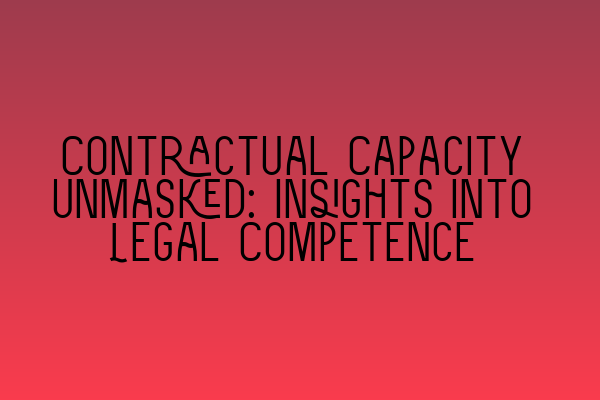Contractual Capacity Unmasked: Insights into Legal Competence
In the world of contract law, contractual capacity is a fundamental principle that determines the legal competence of parties involved in a contract. Understanding the concept of contractual capacity is crucial for solicitors, as it helps in assessing the validity and enforceability of contracts. In this blog post, we will explore the intricacies of contractual capacity and its significance in contract law.
What is Contractual Capacity?
Contractual capacity refers to the legal ability of an individual or entity to enter into a binding contract. In simple terms, it means that the parties involved in a contract must possess the mental and legal competence to understand and consent to the terms and obligations of the agreement. Lack of contractual capacity can render a contract void or voidable.
Contractual capacity is governed by various legal principles and rules, which may vary across jurisdictions. It is important to understand the specific requirements of contractual capacity in the relevant legal framework. For instance, in England and Wales, the concept of contractual capacity is primarily guided by the Mental Capacity Act 2005.
Key Factors Affecting Contractual Capacity
There are several factors that can impact an individual’s contractual capacity:
- Age: Minors (individuals under the age of 18) generally lack full contractual capacity. They are considered legally incompetent to enter into binding contracts, except for certain limited exceptions. It is crucial to determine whether a minor has the legal capacity to enter into a particular contract.
- Mental Capacity: Individuals with mental impairments or disabilities may have limited or no contractual capacity. In such cases, the law often requires a formal assessment of mental capacity to determine whether the individual can understand and consent to the contract.
- Intoxication: Contracts entered into while one party is under the influence of drugs or alcohol may be voidable. However, the level of intoxication required to affect contractual capacity can vary, and it is essential to evaluate the circumstances of each case.
Presumption of Contractual Capacity
In most cases, the law presumes that adults of sound mind have full contractual capacity. However, this presumption can be rebutted if evidence suggests otherwise. For instance, if it can be proven that an individual lacked the mental capacity to understand the nature and consequences of a contract, the court may declare the contract voidable.
When dealing with individuals who may have limited contractual capacity, solicitors must exercise caution and ensure proper evaluation and documentation to safeguard the interests of all parties involved. Legal expertise is invaluable in assessing contractual capacity and advising clients accordingly.
Implications of Lack of Contractual Capacity
If a party lacks the requisite contractual capacity, the contract may be deemed void or voidable. This means that the contract is either considered invalid from the outset or can be terminated at the option of the party lacking capacity. In such cases, the party lacking capacity may be entitled to a refund or restitution.
It is important to note that in some situations, a contract involving a party with limited capacity may still be enforceable if it is in their best interest or falls within the scope of certain legal exceptions. However, seeking professional legal advice is crucial to navigate such complex scenarios.
Conclusion
Contractual capacity is a critical aspect of contract law that ensures the fairness and effectiveness of agreements. Recognizing the factors that affect contractual capacity and understanding the legal framework surrounding it is vital for solicitors to provide accurate advice and protect the rights of their clients.
At SQE Contract Law, we are committed to providing comprehensive legal guidance on all aspects of contract law, including contractual capacity. Our SQE 2 Preparation Courses and SQE 1 Preparation Courses equip future solicitors with the knowledge and expertise necessary to excel in their legal careers. Stay updated with the latest SRA SQE Exam Dates and test your knowledge with our SQE 1 Practice Exam Questions and SQE 1 Practice Mocks FLK1 FLK2 to enhance your understanding of contract law.
